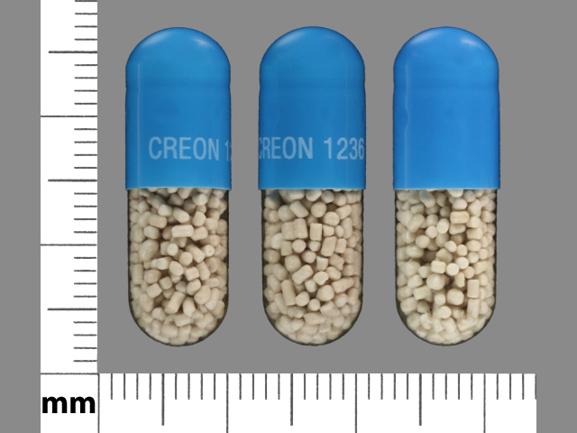Creon
Generic name: pancrelipase [ pan-kre-LYE-pace ]
Drug class: Digestive enzymes
What is Creon?
Creon contains a combination of three enzymes (proteins): lipase, protease, and amylase. These enzymes are normally produced by the pancreas and are important in the digestion of fats, proteins, and sugars.
Creon is used to replace these enzymes when the body does not have enough of its own. Certain medical conditions can cause this lack of enzymes, including cystic fibrosis, chronic inflammation of the pancreas, or blockage of the pancreatic ducts.
Creon may also be used following surgical removal of the pancreas.
Warnings
Call your doctor at once if you have symptoms of a rare but serious bowel disorder: severe or unusual stomach pain, vomiting, bloating, diarrhea, or constipation.
Do not chew or keep Creon in your mouth. Creon can irritate the inside of your mouth.
Before taking this medicine
To make sure Creon is safe for you, tell your doctor if you have ever had:
-
kidney disease;
-
gout;
-
high blood uric acid levels (called hyperuricemia);
-
diabetes;
-
a blockage or scarring in your intestines;
-
trouble swallowing pills;
-
lactose intolerance; or
-
or pork protein allergy.
Tell your doctor if you are pregnant or plan to get pregnant, or if you are breastfeeding or plan to breastfeed.
How should I take Creon?
Take Creon exactly as prescribed by your doctor. Follow all directions on your prescription label. Do not take this medicine in larger or smaller amounts or for longer than recommended. Do not switch brands of this medicine without your doctor's advice.
Creon should be taken with a meal or snack.
Read all patient information, medication guides, and instruction sheets provided to you. Be especially careful to follow all directions about giving this medicine to a child. Ask your doctor or pharmacist if you have any questions.
Do not crush, chew, or break open a capsule. Swallow the capsule whole with a full glass of water.
Do not hold the pill in your mouth. Creon can irritate the inside of your mouth.
You may open the Creon capsule and sprinkle the medicine into a spoonful of applesauce to make swallowing easier. Swallow the mixture right away without chewing. Do not save for later use.
Do not mix the medicine with infant formula or breast milk. Give Creon prior to each feeding.
Do not inhale the powder from a Creon capsule, or allow it to touch your skin. It may cause irritation, especially to your nose and lungs.
Tell your doctor if you have any changes in weight. Creon doses are based on weight (especially in children and teenagers), and any changes may affect the dose.
Use this medicine regularly to get the most benefit. Get your prescription refilled before you run out of medicine completely.
Creon must be stored at room temperature 15°C to 25°C (59°F to 77°F) and protected from moisture. Short term storage is permitted at temperatures between 25°C to 40°C (77°F to 104°F) for up to 30 days. Creon should be discarded if exposed to higher temperature and moisture conditions higher than 70%. After opening, keep bottle tightly closed between uses to protect from moisture.
Your medicine bottle may also include a packet or canister of moisture-absorbing preservative. Keep this packet in the bottle at all times.
Call your doctor if you have any worsening of a long-term pancreas problem.
What happens if I miss a dose?
Take the missed dose with your next meal or snack. Do not take extra medicine to make up the missed dose.
What happens if I overdose?
Seek emergency medical attention or call the Poison Help line at 1-800-222-1222.
What to avoid
Follow your doctor's instructions about any restrictions on food, beverages, or activity.
Creon side effects
Get emergency medical help if you have signs of an allergic reaction to Creon: hives; difficulty breathing; swelling of your face, lips, tongue, or throat.
Call your doctor at once if you have:
-
joint pain or swelling; or
-
symptoms of a rare but serious bowel disorder - severe or unusual stomach pain, vomiting, bloating, diarrhea, constipation.
Tell your doctor if your child is not growing at a normal rate while using Creon.
Common Creon side effects may include:
-
stomach pain, gas, vomiting;
-
diarrhea, frequent or abnormal bowel movements;
-
rectal itching;
-
headache, dizziness;
-
runny or stuffy nose, cough, sore throat; or
-
changes in your blood sugar.
This is not a complete list of side effects and others may occur. Call your doctor for medical advice about side effects. You may report side effects to FDA at 1-800-FDA-1088.
Related/similar drugs
Zithromax
Zithromax (azithromycin) treats infections caused by bacteria, such as respiratory infections, skin ...
Zenpep
Zenpep (pancrealipase) is used to replace pancreatic enzymes when the body does not have enough of ...
Pancreaze
Pancreaze (pancrelipase) is used to treat exocrine pancreatic insufficiency. Includes Pancreaze ...
What other drugs will affect Creon?
Other drugs may interact with Creon, including prescription and over-the-counter medicines, vitamins, and herbal products. Tell your doctor about all your current medicines and any medicine you start or stop using.
Frequently asked questions
More about Creon (pancrelipase)
- Check interactions
- Compare alternatives
- Pricing & coupons
- Reviews (58)
- Drug images
- Side effects
- Dosage information
- During pregnancy
- Support group
- FDA approval history
- Drug class: digestive enzymes
- Breastfeeding
- En español
Patient resources
Other brands
Zenpep, Pancreaze, Pertzye, Viokace, ... +3 more
Professional resources
Other brands
Zenpep, Pancreaze, Pertzye, Viokace
Related treatment guides
Further information
Remember, keep this and all other medicines out of the reach of children, never share your medicines with others, and use Creon only for the indication prescribed.
Always consult your healthcare provider to ensure the information displayed on this page applies to your personal circumstances.
Copyright 1996-2025 Cerner Multum, Inc. Version: 10.01.

